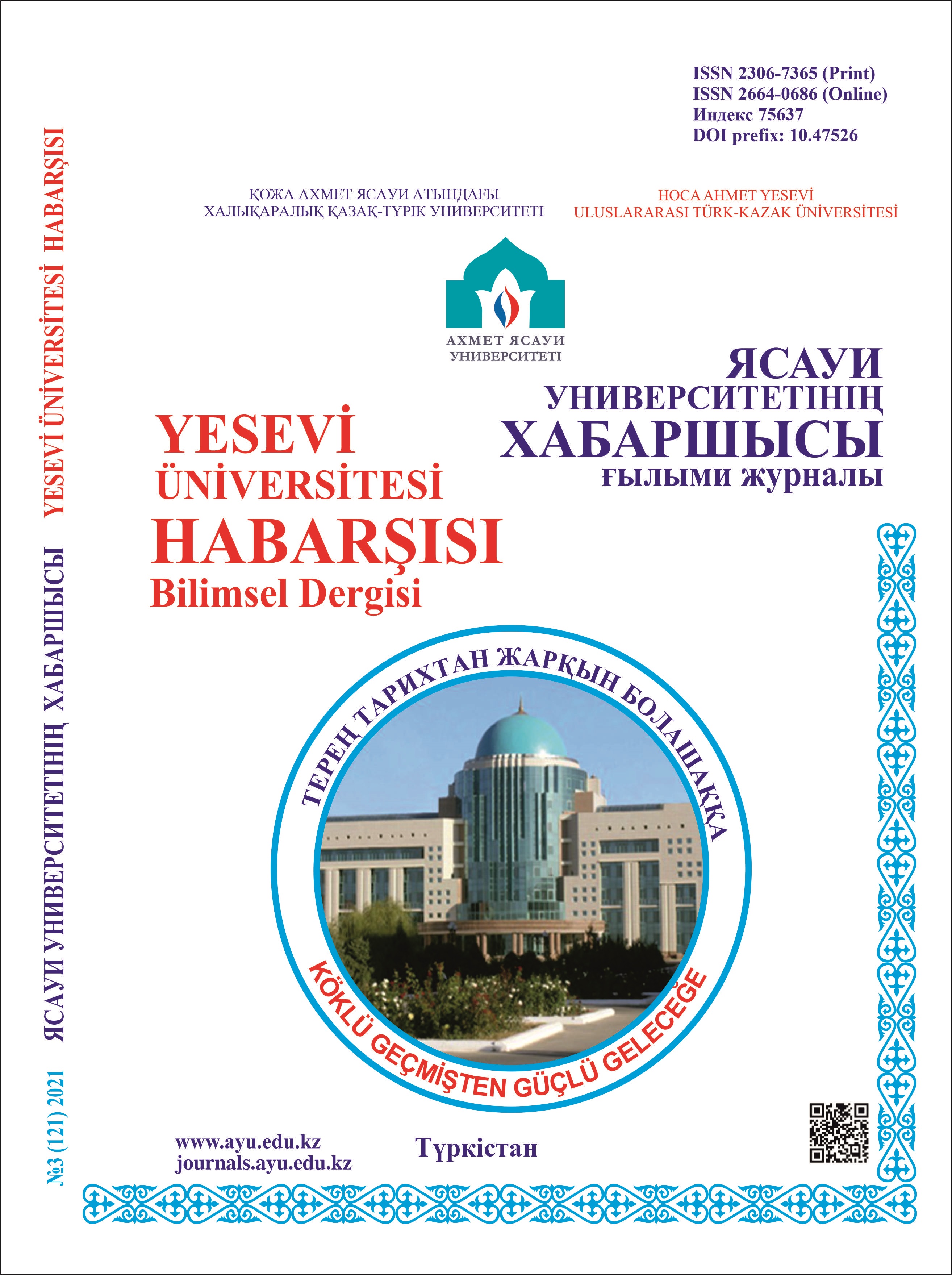BİLGİ TEKNOLOJİLERİ TEMELİNDE İNGİLİZCE ÖĞRETİMİNDE STRATEJİK YETKİNLİK OLUŞTURMA YÖNTEM VE TEKNİKLERİ
349 411
Anahtar Kelimeler:
strategic competence, information technologies, competence-based approach, effective methods and techniques of teaching English, communicative competence.Özet
This article deals with some effective methods and techniques for the formation of strategic competence in teaching English based on the use of information technologies. Strategic competence as one of the main components of communicative competence refers to the ability to overcome difficulties in the process of communication in a foreign language (English). Strategic competence is the ability and skill to choose the most effective strategies (methods) for mastering the material and applying it in solving various communication problems. The formation of strategic competence in the process of teaching English makes it possible to choose and apply the most effective strategies for solving various problems in the communication process, and it should be pointed out that this process is more effective when using information technologies in the educational process. The formation of strategic competence in the process of teaching English based on information technologies involves mastering such general skills as drawing up a strategic plan for the implementation of a specific communicative task to improve communication in the future. The use of information technologies in the process of teaching English contributes to the growth of students' interest in the ability and willingness to take risks in communication situations to compensate for language knowledge or communication skills; the ability to use cognitive skills as well as improve communicative competence by asking clarifying questions about the language situation. English classes using information technologies in the process of developing strategic competence are distinguished by their diversity, efficiency and increased motivation of students to learn English.
Referanslar
Wang Z., He J. On influence of Computer Multimedia Technology in language learning // Journal of Physics Conference series: Earth and environment science. – 2021. – Vol. 1802, Issue 3. – P. 1–5.
Cakici D. The use of ICT in teaching English as a foreign language // Participatory educational research. – 2016. – Т. 4. – №2. – С. 73–77. [Electronic resource]. URL: https://dergipark.org.tr/en/pub/per/issue/47596/601260
Ellis R. Understanding second language acquisition. – Oxford: Oxford University Press, 1987. – 529 p.
Faerch C., Kasper G. Processes and strategies in foreign language learning and communication // International Studies Bulletin. – 1989. – №5. – P. 47–118.
Moirand S. Enseigner à communiquer en langue étrangère. – Paris: Hachette, 1990. – 214 p.
Trenholm S., Jensen A. Interpersonal Communication. – Oxford: Oxford University Press, 2004. – 434 p.
Крюкова О.П. Самостоятельное изучение иностранных языков в компьютерной среде (на примере английского языка). – М.: Логос, 1998. – 126 c.
Council of Europe: Symposium on «Key Competencies for Europe»: Doc. DECS/SC/Sec (96)43. – Bern, 1996.
Ризаходжаева Г.А. Повышение профессионализма специалистов в области туризма как основополагающий фактор привлечения туристов (на примере памятника аркхитектуры Ходжи Ахмеда Ясави) // Международный симпозиум по Ходже Ахмеду Ясави. – Анкара, 2016. – С. 313–318.
Указ Президента Республики Казахстан. Государственная программа развития образования на 2011–2020 годы. Утверждена 7 декабря 2010 года №1118.
REFERENCES
Wang Z., He J. On influence of Computer Multimedia Technology in language learning // Journal of Physics Conference series: Earth and environment science. – 2021. – Vol. 1802, Issue 3. – P. 1–5.
Cakici D. The use of ICT in teaching English as a foreign language // Participatory educational research. – 2016. – T. 4. – №2. – S. 73–77. [Electronic resource]. URL: https://dergipark.org.tr/en/pub/per/issue/47596/601260
Ellis R. Understanding second language acquisition. – Oxford: Oxford University Press, 1987. – 529 p.
Faerch C., Kasper G. Processes and strategies in foreign language learning and communication // International Studies Bulletin. – 1989. – №5. – P. 47–118.
Moirand S. Enseigner à communiquer en langue étrangère [Teaching to communicate in a foreign language]. – Paris: Hachette, 1990. – 214 p. [in French]
Trenholm S., Jensen A. Interpersonal Communication. – Oxford: Oxford University Press, 2004. – 434 p.
Kriukova O.P. Samostoiatelnoe izuchenie inostrannyh iazykov v kompiuternoi srede (na primere angliyskogo iazyka) [Independent study of foreign languages in a computer environment (on the example of the English language)]. – M.: Logos, 1998. – 126 c. [in Russian]
Council of Europe: Symposium on «Key Competencies for Europe»: Doc. DECS/SC/Sec (96)43. – Bern, 1996.
Rizahodjaeva G.A. Povyshenie professionalizma specialistov v oblasti turizma kak osnovopolagaiushiy faktor privlecheniia turistov (na primere pamiatnika arhitektury Hodji Ahmeda Iasavi) [Improving professionalism of the specialists in the field of tourism as the fundamental factor for attracting tourists (on the example of architectural monument of Khoja Ahmed Yassawi)] // Mejdunarodnyi simpozium po Hodje Ahmedu Iasavi. – Ankara, 2016. – S. 313–318. [in Russian]
Ukaz Prezidenta Respubliki Kazahstan. Gosudarstvennaia programma razvitiia obrazovaniia na 2011–2020 gody [Decree of the President of the Republic of Kazakhstan. State program for the development of education for 2011-2020]. Utverjdena 7 dekabria 2010 goda №1118. [in Russian]

